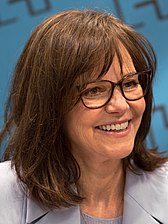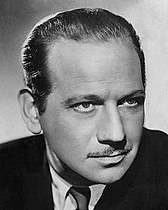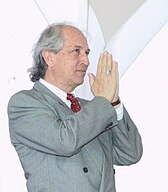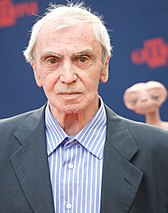User:Birdienest81/sandbox thirty-two
| 52nd Academy Awards | |
|---|---|
| Date | April 14, 1980 |
| Site | Dorothy Chandler Pavilion Los Angeles, California, U.S. |
| Hosted by | Johnny Carson |
| Produced by | Howard W. Koch |
| Directed by | Marty Pasetta |
| Highlights | |
| Best Picture | Kramer vs. Kramer |
| Most awards | Kramer vs. Kramer (5) |
| Most nominations | All That Jazz and Kramer vs. Kramer (9) |
| TV in the United States | |
| Network | ABC |
| Duration | 3 hours, 12 minutes |
The 52nd Academy Awards ceremony, organized by the Academy of Motion Picture Arts and Sciences (AMPAS), honored films released in 1979 and took place on April 14, 1980, at the Dorothy Chandler Pavilion in Los Angeles beginning at 6:00 p.m. PST / 9:00 p.m. EST. During the ceremony, AMPAS presented Academy Awards (commonly referred to as Oscars) in 23 categories. The ceremony, televised in the United States by ABC, was produced by Howard W. Koch and directed by Marty Pasetta.[1] Comedian and talk show host Johnny Carson hosted the show for the second consecutive year. Three days earlier, in a ceremony held at The Beverly Hilton in Beverly Hills, California, on April 11, the Academy Scientific and Technical Awards were presented by hosts Cloris Leachman and William Shatner.[2]
Kramer vs. Kramer won five awards, including Best Picture.[3] Other winners included All That Jazz with four awards, Apocalypse Now and Norma Rae with two, and Alien, Being There, Best Boy, Board and Care, Breaking Away, Every Child, A Little Romance, Paul Robeson: Tribute to an Artist, and The Tin Drum with one.
Winners and nominees
[edit]The nominees for the 52nd Academy Awards were announced on February 25, 1980, by Academy president Fay Kanin and actors Ed Asner and Yvette Mimieux.[4] All That Jazz and Kramer vs. Kramer tied for the most nominations with nine each.[5] The winners were announced at the awards ceremony on April 14. At age eight, Best Supporting Actor nominee Justin Henry became the youngest person nominated for an Oscar.[6]
Awards
[edit]Winners are listed first, highlighted in boldface and indicated with a double dagger (‡).[7]
Academy Honorary Awards
[edit]- Hal Elias – "For his dedication and distinguished service to the Academy of Motion Picture Arts and Sciences."[8]
- Alec Guinness – "For advancing the art of screen acting through a host of memorable and distinguished performances."[9]
Jean Hersholt Humanitarian Award
[edit]The award recognizes individuals whose humanitarian efforts have brought credit to the motion picture industry.[10]
Irving G. Thalberg Memorial Award
[edit]The award honors "creative producers whose bodies of work reflect a consistently high quality of motion picture production".[12]
Special Achievement Award
[edit]- Alan Splet for the sound effects editing in The Black Stallion[14]
Academy Award for Technical Achievement
[edit]- Mark Serrurier – "For the progressive development of the Moviola from the 1924 invention of his father, Iwan Serrurier, to the present Series 20 sophisticated film editing equipment."[15]
Multiple nominations and awards
[edit]
|
|
Presenters and performers
[edit]The following individuals, listed in order of appearance, presented awards or performed musical numbers.[16]
Presenters
[edit]Performers
[edit]| Name | Role | Performed |
|---|---|---|
| Henry Mancini | Musical arranger Conductor |
Orchestral |
| Kermit the Frog | Performer | "Rainbow Connection" from The Muppet Movie |
| Dudley Moore Helen Reddy |
Performers | "Song from 10 (It's Easy to Say)" from 10 |
| Melissa Manchester | Performer | "Through the Eyes of Love" from Ice Castles and "I'll Never Say Goodbye" from The Promise |
| Donald O'Connor | Performer | "Dancin' on the Silver Screen" |
| Dionne Warwick | Performer | "It Goes Like It Goes" from Norma Rae |
| Academy Awards Chorus | Performers | "That's Entertainment" during the closing credits |
Ceremony information
[edit]
In September 1979, the Academy hired film producer Howard W. Koch to produce the telecast for the sixth time.[18] Upon being named producer, Koch responded in a press release stating, "I plan to involve all the professional and creative talents of the motion picture community in this program, as the Academy Awards, in the public's mind, represents the entire field of filmmaking."[19] Two months later, it was announced that comedian and The Tonight Show host Johnny Carson would preside over emceeing duties for the 1980 ceremony.[20] "Johnny Carson is one of our national treasures. He was selected as this year's host because his wit and verve made him an outstanding master of ceremonies at last year's show," said Koch in a statement justifying his selection for host.[21]
Several other people were involved with the production of the ceremony. Marty Pasetta was hired as director of the telecast.[22] Henry Mancini served as musical director and conductor for the ceremony where he conducted an overture performed by the orchestra at the beginning of the show.[23] A song-and-dance number featuring actor and singer Donald O'Connor paid tribute to choreography in film.[24]
Critical reviews and ratings
[edit]Some media outlets received the broadcast critically. The Arizona Republic columnist Michael Maza wrote, "Watching last night's 52nd Annual Academy Award ceremonies was like sitting through three hours and 15 minutes of near-flawless close order drill. It wasn't long before the feet seemed to blur."[25] Jack Mathews of the Detroit Free Press commented, "In any event, the 52nd Academy Awards presentation will stand as one of the smoothest, most predictable, most reasonable Oscar nights in history. Also, alas, one of the most boring."[26] The Baltimore Sun television critic Bill Carter quipped, "We found out Monday night when this year's edition of the Oscarcast streamlined to the point of emaciation (and still more than three hours long), thudded along like some awards dinner of the meat-packing industry." He praised Carson's hosting performance, but said, "For all the excitement this parade of stars provided, they might as well have sent in their stand-ins, or maybe some robot, or well dressed mannequins from a boutique on Rodeo Drive. This just wasn't a little boring, this was mind-numbingly boring."[27]
Others received the broadcast positively. Los Angeles Times film critic Charles Champlin mused, "As a show, the Marty Pasetta-Howard Koch special revealed again a gift for all that pizzazz." He added, "If nobody in fact was dozing, it was thanks to Carson's own relaxed and engaging presence. Among his virtues, he is an emcee who seems to love the movies."[28] Film critic Gene Siskel from the Chicago Tribune commented, "The show was a visual delight, thanks to special electronic effects that presented scenes from each nominated film as its title was announced."[29] Columnist Patrick Taggart of the Austin American-Statesman wrote, "Aren't we entitled to at least one upset victory among the nominees? The 52nd running of the Academy Awards was distinguished by the utter lack of any such color; but somehow, in spite of its slickness, Monday's show was a relatively good one."[30]
The American telecast on ABC drew in an average of 49 million people over the length of the entire ceremony, which was a 6% increase from the previous year's ceremony.[31] However, the show drew lower Nielsen ratings compared to the previous ceremony with 33.7% of households watching with a 55% share.[32]
See also
[edit]References
[edit]- ^ Osborne 2013, p. 413
- ^ "Past Scientific & Technical Awards Ceremonies". Academy of Motion Picture Arts and Sciences. Archived from the original on February 13, 2014. Retrieved July 31, 2013.
- ^ Harmetz, Aljean (April 15, 1980). "Oscars Won by Kramer, Hoffman and Miss Field; All That Jazz Takes Craft Awards Kramer vs. Kramer Is the Oscar Leader 'New and Old Managements' Carson's 2d Year as Emcee Honorary Awards Streets Are Quieter". The New York Times. Retrieved March 26, 2020.
- ^ Thomas, Bob (February 26, 1980). "All That Jazz, Kramer Lead Oscar Nominations". The Spokesman-Review. p. 14.
- ^ Arnold, Gary (February 26, 1980). "Kramer and Jazz . . ". The Washington Post. Retrieved February 15, 2020.
- ^ Kinn & Piazza 2002, p. 219
- ^ "The 52nd Academy Awards (1980) Nominees and Winners". Academy of Motion Picture Arts and Sciences. Archived from the original on November 10, 2014. Retrieved October 7, 2011.
- ^ Cook 2000, p. 513
- ^ Franks 2005, p. 247
- ^ "Jean Hersholt Humanitarian Award". Academy of Motion Picture Arts and Sciences. Archived from the original on 16 November 2020. Retrieved 12 November 2020.
- ^ Holden 1993, p. 591
- ^ "Irvin G. Thalberg Memorial Award". Academy of Motion Picture Arts and Sciences. Archived from the original on January 1, 2016. Retrieved December 18, 2015.
- ^ "Hollywood Film Producer, Power Broker Ray Stark". The Washington Post. January 20, 2004. Retrieved July 15, 2022.
- ^ "Academy Awards Acceptance Speech Database". Academy of Motion Picture Arts and Sciences. Retrieved July 15, 2022.
- ^ Kinn & Piazza 2002, p. 221
- ^ Wiley & Bona 1996, p. 578
- ^ Terrance 2013, p. 14
- ^ "Koch Again". South Bend Tribune. September 30, 1979. p. 61.
- ^ "Howard W. Koch to Produce 52nd Annual Oscar Show". Academy of Motion Picture Arts and Sciences. September 7, 1979. Retrieved July 13, 2022.
- ^ "Carson to Host Show". Reno Gazette-Journal. November 27, 1979. p. 10.
- ^ "Johnny Carson Set As Master of Ceremonies for 52nd Annual Academy Awards". Academy of Motion Picture Arts and Sciences. November 6, 2013. Retrieved July 13, 2022.
- ^ Boyer, Peter J. (April 14, 1980). "Marty Pasetta Has Hopes for a Lively Oscar Show". The Baltimore Sun. p. B6.
- ^ Osborne 2013, p. 413
- ^ Wiley & Bona 1996, p. 580
- ^ Maza, Michael (April 15, 1980). "Ho-Hum Oscars Was a 'Bowling Boquet of Stars'". The Arizona Republic. p. B5.
- ^ Mathews, Jack (April 15, 1980). "How Divorce, War and Death Can Turn Into a Big Yawner". Detroit Free Press. p. 12C.
- ^ Carter, Bill (April 16, 1980). "Oscarcast Without Silliness: How Boring". The Baltimore Sun. p. B4.
- ^ Champlin, Charles (April 16, 1980). "The Oscar Derby: A Horse Race After All". Los Angeles Times. p. 100.
- ^ Siskel, Gene (April 15, 1980). "Oscars to Field, Hoffman, Kramer". Chicago Tribune. p. 14.
- ^ Taggart, Patrick (April 16, 1980). "Awards Show Sailed on Calm Waters". Austin American-Statesman. pp. E7.
- ^ Consoli, Jon (February 21, 2013). "Spotlight's on Oscars But for ABC, Ratings Wins Begin on Red Carpet". Broadcasting & Cable. Retrieved April 16, 2022.
- ^ Margulies, Lee (April 18, 1980). "Ratings Race a Photo Finish?". Los Angeles Times. p. 119.
Bibliography
[edit]- Cook, David A. (2000), Lost Illusions: American Cinema in the Shadow of Watergate and Vietnam, 1970-1979, Berkeley, California, United States: University of California Press, ISBN 978-0-5202-3265-5
- Franks, Don (2005), Entertainment Awards: A Music, Cinema, Theatre and Broadcasting Guide, 1928 through 2003 (3rd ed.), Jefferson, North Carolina, United States: McFarland & Company, ISBN 978-1-5791-2396-3
- Holden, Anthony (1993), Behind the Oscar: The Secret History of the Academy Awards, New York, New York, United States: Simon & Schuster, ISBN 978-0-6717-0129-1
- Kinn, Gail; Piazza, Jim (2002), The Academy Awards: The Complete Unofficial History, New York, New York, United States: Workman Publishing Company, ISBN 978-1-5791-2396-3
- Osborne, Robert (2013). 85 Years of the Oscar: The Complete History of the Academy Awards. New York, New York, United States: Abbeville Publishing Group. ISBN 978-0-7892-1142-2. OCLC 856879222.
- Terrance, Vincent (2013). Television Specials: 5,336 Entertainment Programs, 1936–2012 (5 ed.). Jefferson, North Carolina, United States: Ballantine Books, McFarland & Company. ISBN 978-1-4766-1240-9. OCLC 844373010.
- Wiley, Mason; Bona, Damien (1996), Inside Oscar: The Unofficial History of the Academy Awards (5 ed.), New York, New York, United States: Ballantine Books, ISBN 978-0-3454-0053-6, OCLC 779680732







